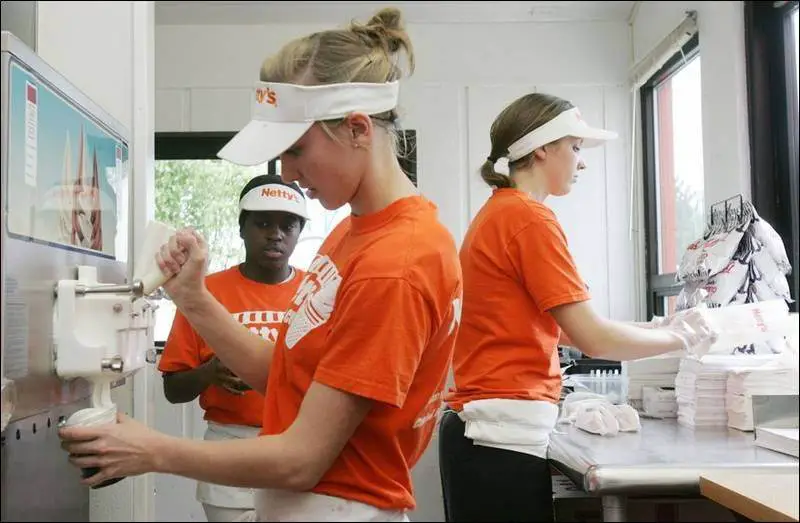Be Humble
Not to sound like a dad, but there’s a lot to be said for learning the value of hard work.
By Anne Buzzell, Hillsdale College
Most college students, if they are privileged enough to have the luxury of considering more than how much a position pays, have at least two requirements for their summer job: It must look good on their resume, and it has to be able to impress everyone who asks what they’re up to this summer.
These criteria are often subconscious, but they are certainly real. Common sense will easily lead you to the conclusion that jobs doing research in a university’s chemistry labs, working for Senator Jones’ campaign or possibly interning at a major corporation look a lot more impressive on a resume than flipping burgers at McDonald’s or bagging groceries does.
Sometimes, though, the burgers and groceries are the only jobs out there. It can be tempting to write off such jobs as temporary solutions with no long-term value, but that would be a mistake. Although entry-level, minimum-wage jobs are rarely prestigious or exciting, but they have their benefits too.
1. Build Some Character
Starting off in an unfamiliar environment, where the regular employees already know how to do everything, is excellent for learning humility, because it forces you to ask for help and accept corrections.
Plus, doing work that’s easy to take for granted, such as refolding clothes in a department store, increases your patience and compassion for others who do those jobs, when the roles switch and you’re back in the customer’s position. Humility and empathy, besides being valuable personal traits, are also useful qualities in professional situations, which leads to my next point.
2. Life Skills Bonus
It may be cliché to say that the skills you learn in an entry-level job will always be applicable, but it’s also true, even if you’re looking to land a career in a white-collar field. The specific skills and duties required by a blue-collar job, such as waiting tables, may not transfer well to white-collar jobs, but the way an employee approaches their tasks will.
Any job will require working hard even when it’s not enjoyable, because there will always be boring and unpleasant aspects of a job. Being patient, treating customers with respect, even if you’re tired and knowing how to work under difficult bosses are all skills that you can learn while holding a temporary job that will stand you in good stead throughout your career. Forming good working-habits in jobs that don’t seem important makes it easier to continue those habits in later jobs.
3. Strengthen Your References
If managers like the work you’re doing, they’re usually happy to provide references for you. A testimony to your good character and work ethic will benefit you, regardless of whether the labor you did at your old job is related to the job you’re applying for or now.
Companies want to hire hard-working, dependable, honest people, because those people make good employees, and every single one of those character traits can be demonstrated in an entry-level job.
4. Find Your Path
Internships are usually recommended as the best way to see how working in a particular field suits you, but entry-level jobs can provide the same end result. You might take a job at a restaurant and realize you despise the food service industry, or you might find that you love it and decide to become a caterer.
When you don’t know exactly what you want to do with your life, any experience can be helpful, even if it only shows you where you don’t want to work.
5. Any Experience Is Valuable
Sometimes having a late birthday can make someone ineligible for certain jobs because they’re too young, even if they are a rising college freshman.
Minimum-wage jobs, however, often hire people as young as fourteen years old. Having a job of any sort on a resume makes it easier to land the next one; everyone has to start somewhere.
6. Get Physical (Labor)
Jobs like waiting tables, restocking grocery store shelves or mowing lawns require near-constant movement, so they become a good way to get exercise.
This is one benefit that people rarely think about, but it is a great advantage over desk jobs that promote unhealthy, sedentary habits. Although some jobs keep people behind a cash register all day long and don’t allow for any exercise, as a whole, blue-collar jobs are more physically active than white-collar jobs.
7. Always Accessible
There is a fairly constant demand for lawnmowers, babysitters and waiters. The same cannot be said for all white-collar jobs; typists, for example, used to be a vital part of every office and are now extinct. Entry-level jobs are rarely restricted to a specific geographic location, and the skills required to obtain them are the same everywhere, which means they can be picked up easily if you move to a new place, like college.
To be fair, there are some real disadvantages to entry-level jobs. They often aren’t directly connected to your desired career path and they will probably, eventually, be replaced on your resume by jobs with more applicable work experience. But entry-level jobs are helpful as a start, regardless of the field you want to spend your career in. They might not be ideal, but they are far from worthless.

The summers before and after my freshman year of college, I was an all-purpose worker at a sandwich shop called Atlanta Bread Company. At various times, I did almost everything except preparing the food: I washed dishes, took orders, restocked condiments and delivered food to tables. Atlanta Bread had some grueling and unpleasant moments, such as when I had to scrape several years’ worth of dirt off the floors with Pine-Sol and a wire broom, or when I had to crawl inside two trash can hutches to scrub out dried food.
Overall, though, it really was a good job. It taught me how to run a cash register, handle frustrated customers and work quickly, but accurately, when three multi-plate orders needed to be taken out at the same time, all useful skills in other situations. If I had spent my time wishing for a “better” job, I probably would not have gained the benefits Atlanta Bread had to offer.
Don’t denigrate a job just because it’s not what you hoped to be doing. Even if the gig seems like–or is–a dead-end job, it can benefit you if you let it.

















